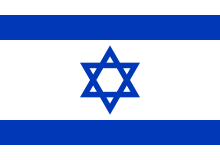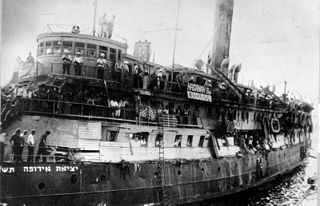

The following is an alphabetical list of articles related to Israel .


The following is an alphabetical list of articles related to Israel .

The history of Israel covers an area of the Southern Levant also known as Canaan, Palestine or the Holy Land, which is the geographical location of the modern states of Israel and Palestine. From a prehistory as part of the critical Levantine corridor, which witnessed waves of early humans out of Africa, to the emergence of Natufian culture c. 10th millennium BCE, the region entered the Bronze Age c. 2,000 BCE with the development of Canaanite civilization, before being vassalized by Egypt in the Late Bronze Age. In the Iron Age, the kingdoms of Israel and Judah were established, entities that were central to the origins of the Jewish and Samaritan peoples as well as the Abrahamic faith tradition. This has given rise to Judaism, Samaritanism, Christianity, Islam, Druzism, Baha'ism, and a variety of other religious movements. Throughout the course of human history, the Land of Israel has come under the sway or control of various polities and, as a result, it has historically hosted a wide variety of ethnic groups.
The Israeli Declaration of Independence, formally the Declaration of the Establishment of the State of Israel, was proclaimed on 14 May 1948 by David Ben-Gurion, the Executive Head of the World Zionist Organization, Chairman of the Jewish Agency for Palestine, and soon to be first Prime Minister of Israel. It declared the establishment of a Jewish state in Eretz-Israel, to be known as the State of Israel, which would come into effect on termination of the British Mandate at midnight that day. The event is celebrated annually in Israel as Independence Day, a national holiday on 5 Iyar of every year according to the Hebrew calendar.
This is a list of notable events in the development of Jewish history. All dates are given according to the Common Era, not the Hebrew calendar.
This is a partial timeline of Zionism in the modern era, since the start of the 16th century.

A homeland for the Jewish people is an idea rooted in Jewish history, religion, and culture. The Jewish aspiration to return to Zion, generally associated with divine redemption, has suffused Jewish religious thought since the destruction of the First Temple and the Babylonian exile.

Aliyah is the immigration of Jews from the diaspora to, historically, the geographical Land of Israel or the Palestine region, which is today chiefly represented by the State of Israel. Traditionally described as "the act of going up", moving to the Land of Israel or "making aliyah" is one of the most basic tenets of Zionism. The opposite action — emigration by Jews from the Land of Israel — is referred to in the Hebrew language as yerida. The Law of Return that was passed by the Israeli parliament in 1950 gives all diaspora Jews, as well as their children and grandchildren, the right to relocate to Israel and acquire Israeli citizenship on the basis of connecting to their Jewish identity.

Yishuv, HaYishuv HaIvri, or HaYishuv HaYehudi Be'Eretz Yisra'el denotes the body of Jewish residents in Palestine prior to the establishment of the State of Israel in 1948. The term came into use in the 1880s, when there were about 25,000 Jews living in that region, and continued to be used until 1948, by which time there were some 630,000 Jews there. The term is still in use to denote the pre-1948 Jewish residents in Palestine, corresponding to the southern part of Ottoman Syria until 1918, OETA South in 1917–1920, and Mandatory Palestine in 1920–1948.

A sabra or tzabar is a modern Hebrew term that defines any Jew born in Israel. The term came into widespread use in the 1930s to refer to a Jew who had been born in Israel, including the British Mandate of Palestine and Ottoman Palestine; cf. New Yishuv & Old Yishuv, though it may have appeared earlier. Since the establishment of the State of Israel in 1948, Israelis have used the word to refer to a Jew born anywhere in the Land of Israel.

Daniel "Danny" Ayalon is an Israeli diplomat, columnist and politician. He served as Deputy Foreign Minister and as a member of the Knesset. He was the Israeli Ambassador to the United States from 2002 until 2006. Previously, he worked as senior foreign policy advisor to Prime Ministers Ariel Sharon, Ehud Barak, and Benjamin Netanyahu.
The Second Aliyah was an aliyah that took place between 1904 and 1914, during which approximately 35,000 Jews, mostly from Russia, with some from Yemen, immigrated into Ottoman Palestine.
The Gathering of Israel, or the Ingathering of the Jewish diaspora, is the biblical promise of Deuteronomy 30:1–5, made by Moses to the Israelites prior to their entry into the Land of Israel.
Israeli Jews or Jewish Israelis comprise Israel's largest ethnic and religious community. The core of their demographic consists of those with a Jewish identity and their descendants, including ethnic Jews and religious Jews alike. Approximately 99% of the global Israeli Jewish population resides in Israel; yerida is uncommon and is offset exponentially by aliyah, but those who do emigrate from the country typically relocate to the Western world. As such, the Israeli diaspora is closely tied to the broader Jewish diaspora.
As an organized nationalist movement, Zionism is generally considered to have been founded by Theodor Herzl in 1897. However, the history of Zionism began earlier and is intertwined with Jewish history and Judaism. The organizations of Hovevei Zion, held as the forerunners of modern Zionist ideals, were responsible for the creation of 20 Jewish towns in Palestine between 1870 and 1897.

The following outline is provided as an overview of and topical guide to Israel:

Shlomo Hillel was an Iraqi-born Israeli diplomat and politician who served as Speaker of the Knesset, Minister of Police, Minister of Internal Affairs, and ambassador to several countries in Africa. As an agent of the Mossad LeAliyah Bet in the late 1940s and early 1950s, he arranged the mass airlift of Iraqi Jews to Israel known as Operation Ezra and Nehemiah.

Israel–Italy relations are the foreign relations between the State of Israel and the Italian Republic. Italy recognized Israel on 8 February 1949, after the Declaration of the Establishment of the State of Israel on 14 May 1948. Italy has an embassy in Tel Aviv, two consulate-generals in West Jerusalem and East Jerusalem, and 4 honorary consulates in Beersheba, Eilat, Haifa and Nazareth. The Italian ambassador in Israel since 2021 is Sergio Barbanti. Israel has an embassy in Rome and the current Israeli Ambassador is Dror Eydar. Both countries are members of the Union for the Mediterranean.

The Hebraization of surnames is the act of amending one's Jewish surname so that it originates from the Hebrew language, which was natively spoken by Jews and Samaritans until it became extinct around 200 CE. For many diaspora Jews, immigrating to the Land of Israel and taking up a Hebrew surname has long been conceptualized as a way to erase remnants of their diaspora experience, particularly since the inception of Zionism in the 19th century. This notion, which was part of what drove the Zionist revival of the Hebrew language, was further consolidated after the founding of the State of Israel in 1948.

Mandatory Palestine was a geopolitical entity that existed between 1920 and 1948 in the region of Palestine under the terms of the League of Nations Mandate for Palestine.
Labor Zionism or socialist Zionism refers to the left-wing, socialist variation of Zionism. For many years, it was the most significant tendency among Zionists and Zionist organizations, and was seen as the Zionist sector of the historic Jewish labour movements of Eastern Europe and Central Europe, eventually developing local units in most countries with sizable Jewish populations. Unlike the "political Zionist" tendency founded by Theodor Herzl and advocated by Chaim Weizmann, Labor Zionists did not believe that a Jewish state would be created by simply appealing to the international community or to powerful nations such as the United Kingdom, Germany, or the former Ottoman Empire. Rather, they believed that a Jewish state could only be created through the efforts of the Jewish working class making aliyah to the Land of Israel and raising a country through the creation of a Labor Jewish society with rural kibbutzim and moshavim, and an urban Jewish Proletariat.